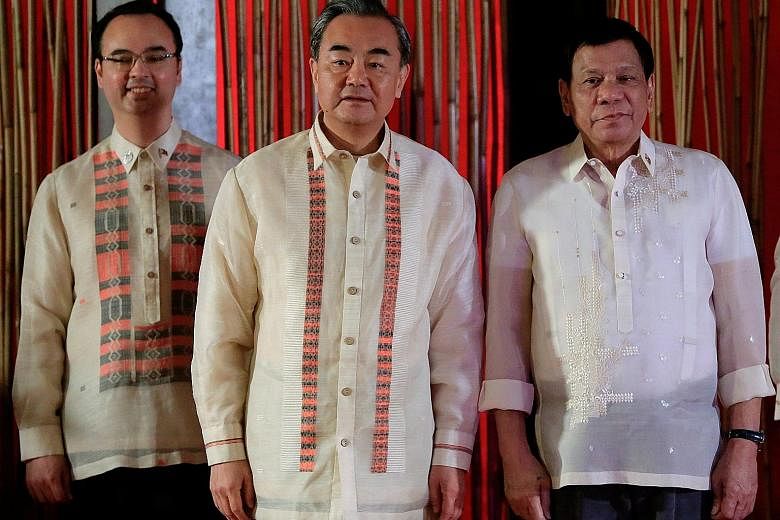Asean foreign ministers ended their annual meeting in Manila on the 50th anniversary of the South-east Asian bloc's formation yesterday, amid calls by the United States, Japan and Australia for a stronger response to China's island-building and militarisation of the South China Sea.
But at a news conference yesterday, Philippine Foreign Secretary Alan Cayetano insisted that a joint communique issued on Sunday after an Asean-China foreign ministers' meeting was "very balanced", as it reflected compromises that all sides had to make.
He said China, for instance, set aside its insistence on a "non-legally binding" code of conduct (COC) on maritime disputes in the South China Sea.
"At first, there was a word in the framework of the COC about 'not being legally binding'. In due time, China dropped that and said, 'Let's approve the framework and let's go now to the COC'," Mr Cayetano told reporters.
He added: "The problem with legally binding is: What are the penalties? What are the mechanisms for adjudication? What tribunal? What court and after that, who will enforce it?
"Some countries are just being practical. It is easier to have binding rather than legally binding. It doesn't mean we're giving up with legally binding."
Mr Cayetano also revealed that the Philippines had pushed to drop references to "land reclamations" and "militarisation" in the South China Sea in the joint communique, as insisted upon by Vietnam, as these were directed at Beijing.
"It's not reflective of the present position... (The Chinese) are not reclaiming any more," he said.
The final version of the communique "emphasised the importance of non-militarisation and self-restraint".
It said that after extensive discussions, concerns were voiced by some members about land reclamation "and activities in the area which have eroded trust and confidence, increased tension and may undermine peace, security and stability".
Malaysia, meanwhile, pushed to include "the presence of military assets" by both claimants and non-claimants. The Philippines and Indonesia vetoed that.
In a joint statement after their foreign ministers met on the sidelines of the same gathering on Sunday, the US, Japan and Australia delivered a noticeably sterner rebuke to Beijing.
Criticising ongoing "land reclamation, construction of outposts, (and) militarisation of disputed features" in the disputed sea, the three countries said any COC must be "legally binding, meaningful and effective", a demand noticeably absent from the Asean statement.
They also called on China and the Philippines to respect last year's ruling by an international arbitration tribunal, which dismissed most of Beijing's claims to the sea.
Reacting to these calls, Mr Cayetano said: "We appreciate not being told what to do."

